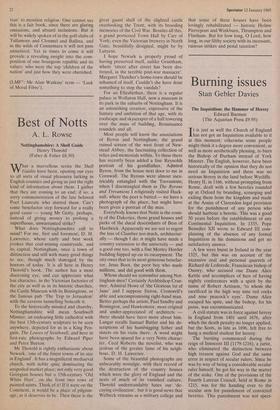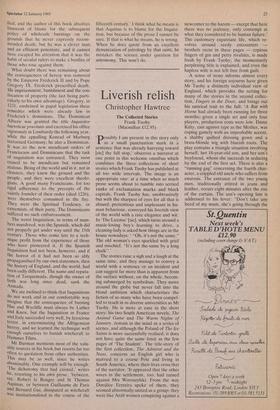Burning issues
Stan Gebler Davies
The Inquisition: the Hammer of Heresy Edward Burman (The Aquarian Press £9.95)
It is just as well the Church of England has not got an Inquisition available to it at this moment: otherwise some people might think it a degree more convenient, as well as more aesthetically pleasing, to burn the Bishop of Durham instead of York Minster. The English, however, have been historically of the opinion that they do not need an Inquisition and there was no serious htresy in the land before Wycliffe. Henry II, in 1166, without prompting from Rome, dealt with a few heretics rounded up at Oxford by branding, scourging and exiling them from the kingdom and made at the Assize of Clarendon legal provision for the punishment of any person who should harbour a heretic. This was a good 50 years before the establishment of any Continental Inquisition. In 1335, Pope Benedict XII wrote to Edward III com- plaining of the absence of any formal Inquisition in his dominions and got no satisfactory answer.
A few were burnt in Ireland in the year 1325, but this was on account of the excessive zeal and personal quarrels of Richard de Lederede, Franciscan bishop of Ossory, who accused one Dame Alice Kettle and accomplices of hers of having nightly conferences with a spirit by the name of Robert Artisson, 'to whom she sacrificed in the high way nine red cocks and nine peacock's eyes'. Dame Alice escaped his spite, and the bishop, for his pains, was excommunicated.
A civil statute was in force against heresy in England from 1401 until 1676, after which the death penalty no longer applied, but the Scots, as late as 1696, felt free to hang a medical student for heresy.
The burning commenced during the reign of Innocent III (1179-1216), a jurist, who eliminated the distinction between high treason against God and the same error in respect of secular rulers. Since he was by way of being a considerable secular ruler himself, he got his way in the matter of the stake. One of the provisions of the Fourth Lateran Council, held at Rome in 1215, was for the handing over to the secular arm for punishment of convicted heretics. This punishment was not speci- fied, and the author of this book absolves Innocent of blame for the subsequent policy of wholesale burnings on the grounds that he never expressly recom- mended death, but he was a clever man and an efficient potentate, and it cannot have escaped his attention that it was the habit of secular rulers to make a bonfire of those who rose against them.
What doubt there was remaining about the consequences of heresy was removed by the Emperor Frederick II and by Pope Gregory IX. Frederick prescribed death, life imprisonment, banishment and the con- fiscation of property (the last being parti- cularly to his own advantage). Gregory, in 1231, enshrined in papal legislation these remedies which were already law in Frederick's dominions. The Dominican Alberic was granted the title Inquisitor haereticae pravitatis and exercised his office Vigorously in Lombardy the following year, While the appalling Konrad of Marburg terrorised Germany, he also a Dominican. It was to the new mendicant orders of Franciscans and Dominicans that the task of inquisition was entrusted. They soon ceased to be mendicant but remained zealous. Being of the world and in it, not in Cloisters,, they knew the ground and 'the People, and they were excellent theolo- gians. A good many Franciscans, for too rigid adherence to the precepts of the saintly founder of their order (died 1226), were themselves consumed in the fire. They were the Spiritual Tendency, or extremists, of their party. The Dominicans suffered no such embarrassment.
The worst Inquisition, in terms of num- bers murdered, was the Spanish, which did not properly get under way until the 15th century. Those who come late to a tech-
, nique profit from the experience of those Who have pioneered it. If the Spanish Inquisition had not been, however, and if the horror of it had not been so ably Propagandised by our own statesmen, then the history of England, and the world, had been sadly different. The name and reputa- tion of Torquemada, though the owner of both was long since dead, sank the Armada.
We are inclined to think that Inquisitions do not work and in out comfortable way imagine that the consequence of burning Hus and Wycliffe must always be Luther and Knox, but the Inquisition in France and Italy succeeded very well, by ferocious terror, in exterminating the Albigensian heresy, and we learned the technique well enough ourselves to banish witchcraft to Hammer Films.
Mr Burman mentions most of the valu- able sources in his book but resorts far too Often to quotation from other authorities. This may be as well, since he writes abominably. One example will be enough. The dichotomy that had existed.' writes he, resorting to his own prose. 'between. say, Robert le Bougre and St Thomas Aquinas, or between Guillaume de Paris and Bernard Gui, dissipated as witchcraft was institutionalised in the course of the fifteenth centur.' I think what he means is that Aquinas is to blame for the Inquisi- tion, but because of the prose I cannot be sure. If that is what he means, he is wrong. When he does quote from an excellent denunciation of astrology by that saint; he mistakes the science under question for astronomy. This won't do.







































 Previous page
Previous page